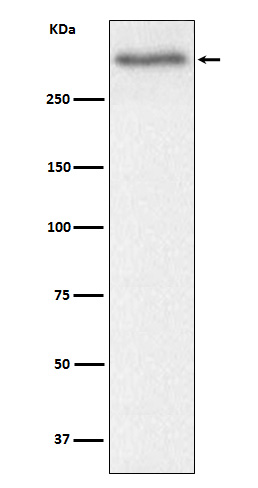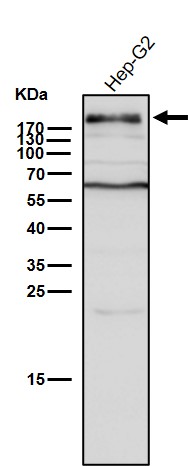

| WB | 咨询技术 | Human,Mouse,Rat |
| IF | 咨询技术 | Human,Mouse,Rat |
| IHC | 1/100-1/200 | Human,Mouse,Rat |
| ICC | 技术咨询 | Human,Mouse,Rat |
| FCM | 咨询技术 | Human,Mouse,Rat |
| Elisa | 咨询技术 | Human,Mouse,Rat |
| Aliases | CSPG2; ERVR; GHAP; PGM; VCAN; Versican; WGN1;;VCAN |
| WB Predicted band size | 373 kDa |
| Host/Isotype | Rabbit IgG |
| Antibody Type | Primary antibody |
| Storage | Store at 4°C short term. Aliquot and store at -20°C long term. Avoid freeze/thaw cycles. |
| Species Reactivity | Human,Mouse,Rat |
| Immunogen | A synthesized peptide derived from human VCAN |
| Formulation | Purified antibody in PBS with 0.05% sodium azide,0.05% BSA and 50% glycerol. |
+ +
以下是关于Versican抗体的3篇参考文献及其摘要概览:
1. **文献名称**:*Versican enhances tumor progression by regulating tumor-associated macrophages*
**作者**:Sheng W. et al.
**摘要**:研究利用Versican抗体通过免疫组化(IHC)和免疫印迹(WB)分析,发现肿瘤微环境中Versican高表达通过调控巨噬细胞极化促进肿瘤转移,提示其作为癌症治疗潜在靶点。
2. **文献名称**:*Versican accumulation in human atherosclerotic lesions*
**作者**:Cattaruzza S. et al.
**摘要**:通过Versican抗体免疫染色,揭示动脉粥样硬化斑块中Versican的异常沉积与平滑肌细胞增殖及脂质滞留相关,为心血管疾病机制研究提供依据。
3. **文献名称**:*Versican expression as a prognostic marker in ovarian carcinoma*
**作者**:Ricciardelli C. et al.
**摘要**:采用Versican抗体检测卵巢癌组织,发现Versican表达水平与患者生存率负相关,提示其可作为预后标志物及治疗靶点。
如需更多文献或具体细节,可进一步检索PubMed或Google Scholar以获取全文信息。
Versican, a large extracellular matrix proteoglycan, plays critical roles in tissue morphogenesis, inflammation, and cancer progression. It belongs to the aggrecan/versican/neurocan family and consists of an N-terminal G1 domain, a central chondroitin sulfate (CS)-attachment region, and a C-terminal G3 domain. Alternative splicing generates four isoforms (V0. V1. V2. V3) with varying CS chain numbers, influencing cell adhesion, proliferation, and migration through interactions with hyaluronan, collagen, and cell surface receptors like CD44.
Versican antibodies are essential tools for studying its expression, localization, and functions. Commonly used clones (e.g., 12C5. D8E5) target specific domains: anti-G1 antibodies (e.g., 12C5) detect full-length versican and its processing fragments, while anti-G3 antibodies (e.g., D8E5) help assess proteolytic cleavage or isoform-specific roles. These antibodies are widely applied in techniques like Western blotting, immunohistochemistry, and immunofluorescence to analyze versican distribution in tissues, particularly in contexts like embryonic development, wound healing, and tumor microenvironments.
Dysregulated versican expression correlates with diseases including atherosclerosis, fibrosis, and metastatic cancers. Antibodies enable researchers to explore versican’s dual roles—either promoting or inhibiting tumor growth depending on cellular context—and its potential as a therapeutic target. Validation using knockout models or siRNA knockdown ensures specificity, as cross-reactivity with other proteoglycans remains a concern. Overall, versican antibodies provide critical insights into extracellular matrix dynamics and disease mechanisms.
×